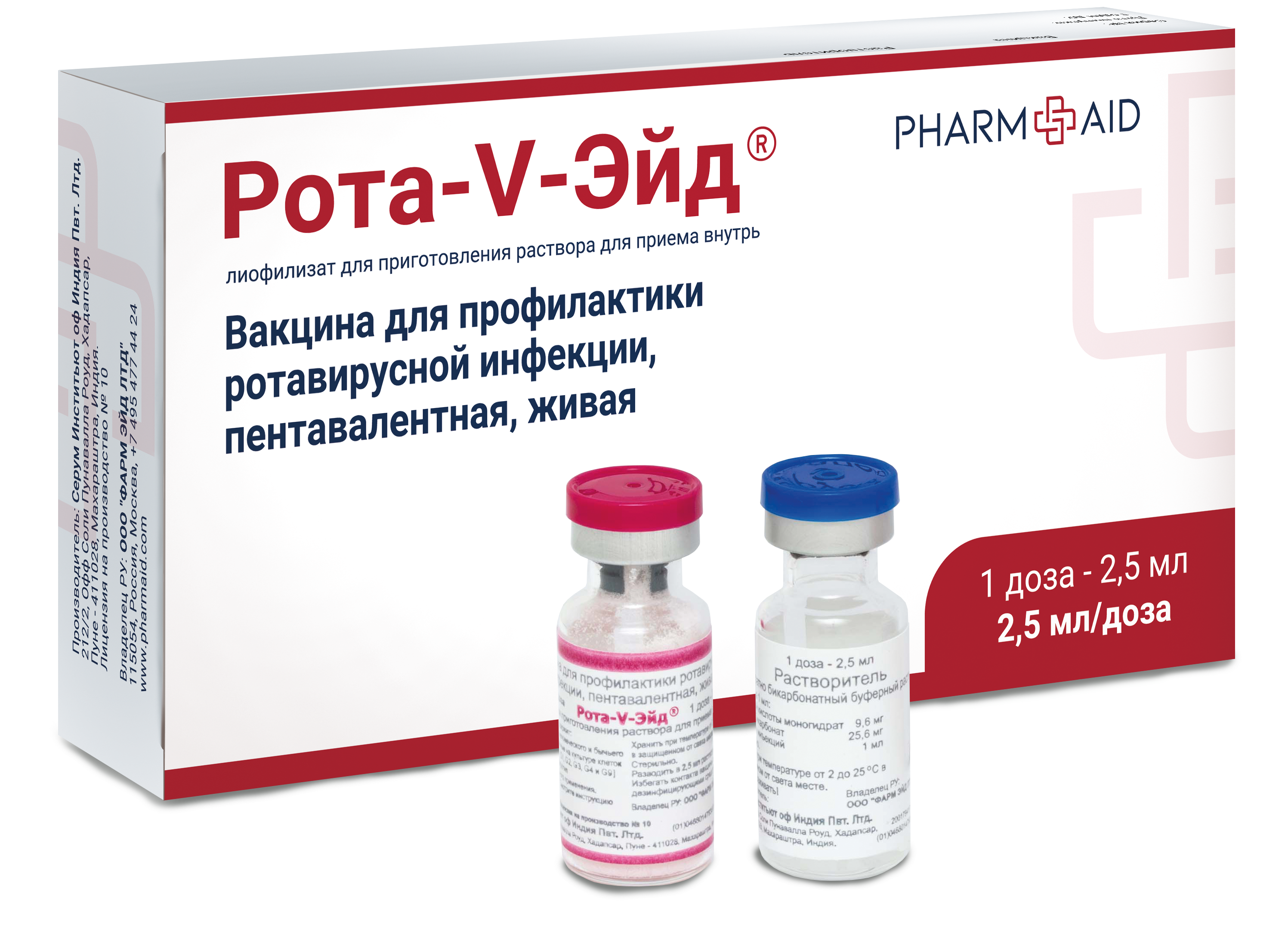Vaccine for the prevention of rotavirus infection

Indications for use
Indications for use
The Rota-V-Aid® vaccine is intended for active immunization of healthy children aged 6 weeks and older in order to prevent gastroenteritis caused by rotaviruses of serotypes G1, G2, G3, G4, G9.
Vaccination scheme
Vaccination scheme
The Rota-V-Aid® vaccine is intended for oral administration only
The vaccination course consists of three doses of Rota-V-Aid®, each dose of 2.5 ml, with intervals between the next dose of at least 4 weeks, starting at 6 weeks of age
The highest incidence of rotavirus gastroenteritis is observed in children of the younger age group, therefore, the use of the Rota-V-Aid® vaccine in children over 24 months of age is not recommended.
Contraindications
Contraindications
· Rota-V-Aid® should not be administered to persons with known hypersensitivity to any component of the vaccine, to persons with anaphylactic reactions after previous administration of this vaccine or a vaccine containing the same components.
· Congenital malformations of the gastrointestinal tract predisposing to intestinal invagination.
· A history of intestinal invagination.
· Severe combined immunodeficiency. As cases of gastroenteritis caused by other live rotavirus vaccines have been reported in children with severe combined immunodeficiency.
· Like other vaccines, the administration of Rota-V-Aid® to people with acute severe febrile diseases should be postponed.
· Severe form of diarrhea.
· Glucose-galactose malabsorption and sucrose intolerance
Storage conditions
Store at room temperature (up to 25°C).
Avoid exposure to sunlight and contact with disinfectants.
Use within 6 hours after reconstitution. During this time, store at 2-8°C.
Manufacturer
SERUM INSTITUTE OF INDIA PVT. LTD.
Описание
Live attenuated oral antiviral vaccine (in lyophilized form) is designed for the active immunization of healthy infants to prevent gastroenteritis caused by rotavirus infection. It is administered orally in a sequence of 3 doses. Manufactured under a license issued by Serum Institute of India Pvt. Ltd., the world's largest vaccine manufacturer, the vaccine holds WHO qualification status and has demonstrated good results in ~170 countries worldwide for several years. Internationally recognized vaccination schedule:
- The first dose at 6 weeks of age;
- The second dose 4 weeks after the first; the third dose 4 weeks after the second;
- In case of incomplete vaccine administration (if the child spits out or regurgitates the vaccine), a single replacement dose may be given during the same vaccination session, as recommended by a physician;
- According to WHO recommendations, if routine childhood vaccinations start later than 6 weeks of age and/or with a longer interval between doses than 4 weeks, the live attenuated rotavirus vaccine (for oral use) can be administered separately or simultaneously with DTP, inactivated poliovirus vaccine (IPV), oral poliovirus vaccine (OPV), conjugated Haemophilus influenzae type b vaccine (Hib), hepatitis B vaccine, and pneumococcal vaccine. The live attenuated rotavirus vaccine (for oral use) does not impose any restrictions on feeding or drinking (including breastfeeding) before or after vaccination.
Each dose of the vaccine suitable for human administration (2.5 ml) contains:
- Live, attenuated bovine/human reassortant rotavirus [G1, G2, G3, G4, and G9] ≥ 10⁵.⁶ FFU/serotype (grown on VERO cells);
- Sterile diluent (citrate-bicarbonate buffer), prepared with 9.6 mg/ml citric acid monohydrate and 25.6 mg/ml sodium bicarbonate.
Frequently Asked Questions
What is rotavirus infection?
Rotavirus infection is one of the most widespread infectious diseases. It primarily affects children from 6 months to 5 years old, with children under 3 years being particularly susceptible.
Typically, after an incubation period of 1-3 days, the illness begins suddenly with a rise in temperature and the onset of vomiting, followed by watery diarrhea. Gastrointestinal symptoms usually disappear within 3-7 days but can last up to 2-3 weeks.
Rotavirus infection can be accompanied by the development of systemic complications such as febrile seizures, pneumonia, anemia, pancreatitis, myocarditis, and other pathological conditions.
What is the danger of rotavirus infection?
The main source of infection is an infected person or an asymptomatic carrier. The causative agent of the infection is the rotavirus. Rotaviruses are relatively stable in the environment; they do not die when water is chlorinated, can survive in tap water for up to 60 days, and on various environmental objects for 10 to 30 days. They are resistant to repeated freezing and relatively resistant to disinfectants.
There are no specific treatments for rotavirus infection. Only symptomatic therapy is available.
How to combat rotavirus infection?
Given the high contagiousness of rotaviruses and the insufficient effectiveness of nonspecific preventive measures (sanitary and hygienic practices), as well as the lack of specific treatment, vaccination is currently recognized as the only effective method for combating rotavirus gastroenteritis.
The World Health Organization (WHO) recommends including vaccines against rotavirus infection in the immunization schedules of all countries, regardless of their level of development and wealth, as a priority.
In the Russian Federation, the rotavirus vaccine is not included in the national immunization schedule, but in several regions of the Russian Federation, vaccination is available to a wide range of children as part of regional vaccination programs.
The vaccination course for the rotavirus vaccines available in the Russian Federation consists of 3 doses, which are administered at intervals of at least 4 weeks, starting when the child is 6 weeks old. The vaccination course should be completed by the time the child is 24 months old (2 years). Rotavirus vaccines can be administered simultaneously with other vaccines in the immunization schedule. The vaccines are given orally and do not increase the injection load on the child.
